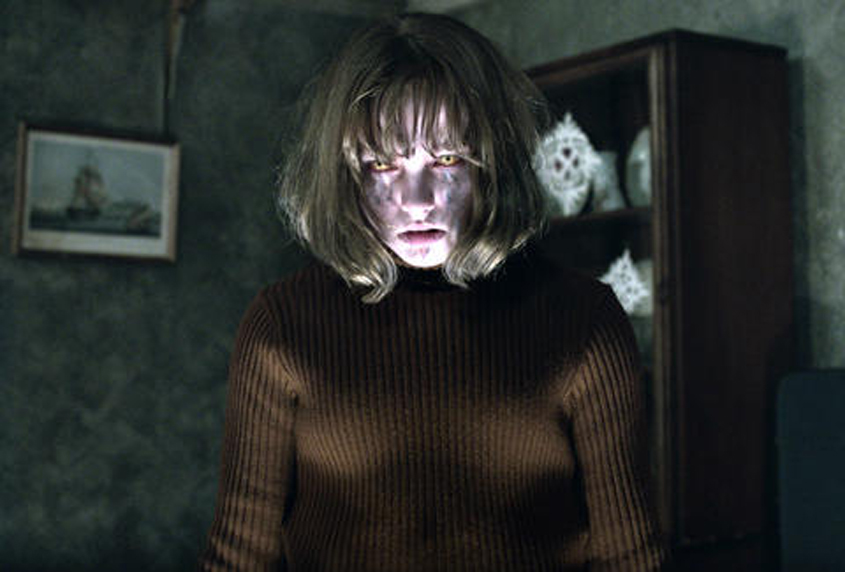Why not go back, and try to understand how horror really was? It was simple, yet would drive you out of a room. Think of a time when people were not aware of any clichés and believed in the supernatural as much as they believed that an apple was on the table. A time when you could see something really disturbing physically take place on the screen, and have no idea whatsoever as to how to comprehend it or respond. Horror, is misconceived as being simply a matter of screams and running away
The Exorcist (1973)
 William Peter Blatty’s trend setting work; till date people have been trying to get Exorcism films right, it had that impact. Directed by William Friedkin, the film contains the iconic scene of the priest outside the house under the street light, wearing a fedora and a trench coat.
William Peter Blatty’s trend setting work; till date people have been trying to get Exorcism films right, it had that impact. Directed by William Friedkin, the film contains the iconic scene of the priest outside the house under the street light, wearing a fedora and a trench coat.
The pair, of a mother and daughter, try to comprehend the anomalies that take place with the little girl. The bed shaking, the abuses she commits to herself and any Christian symbol. This wasn’t simply some flick, it was thoroughly researched and every shot on the screen is physically manifest — except for those eerie moments when the lights go out and a grey, pale face shows up in some corner of the screen.
The film records the terrible ordeal of a priest who tries to save the girl. Full of scenes of gory details, brilliant make up, use of electronic machines for different movements that take place, the entire set up including details like weather and the music, it was a composite whole that could break a person down to the core in fear. All you need is to believe and the movie does the rest.
The Shining (1980)
 Based on Stephen King’s book by the same name, this movie is the beginning of horror in the light of psychology. The track, with the constant screech, and the long shots that steadily wait till characters walk across a colossal empty hotel out in the middle of nowhere, while being stuck in a snowstorm, this Stanley Kubrik’s directorial masterpiece.
Based on Stephen King’s book by the same name, this movie is the beginning of horror in the light of psychology. The track, with the constant screech, and the long shots that steadily wait till characters walk across a colossal empty hotel out in the middle of nowhere, while being stuck in a snowstorm, this Stanley Kubrik’s directorial masterpiece.
Among Jack Nicholson’s finest works, and Danny Lyod as the young Danny Torrance, who set up the creepiest notions about having imaginary friends, The Shinning is full of scenes that wrack the brain. The specific shot of the flood of blood gushing through an elevator door opening was one of the most original things attempted in the history of horror films.
The Thing (1982)
 Yet again secluded, a team of scientists, at a laboratory station in the cold arctic region, discover a parasitic organism of another planet which has the unique ability to imitate organic life and then to assimilate it, thereby turning it into ugly hostile organisms, which wish to devour anything that can walk on limbs.
Yet again secluded, a team of scientists, at a laboratory station in the cold arctic region, discover a parasitic organism of another planet which has the unique ability to imitate organic life and then to assimilate it, thereby turning it into ugly hostile organisms, which wish to devour anything that can walk on limbs.
The brilliance of the movie lies the fact that till about the first twenty minutes you can’t even tell that this is going to turn out into something so unexpected and terrifying. The whole plot and horror experience is based on the fear of being cornered by an enemy which can’t easily be caught because it could have infected anyone that was in the team and having no hope whatsoever of making out alive.
By the end, the visceral experience of the organism which is physically present among the actors, and not floating about on just the screen, makes it a great pick for the horror list.
The Poltergeist (1982)
 Another one of those horror concept films which became the head of its own series. The movie was written and produced by Steven Spielberg. It revolves around an arrangement which in today’s date has become a cliché: a sweet suburban family and a haunted house. But, it was the first of its kind at the time and if you try to go back to this film its novelty surpasses anything that is done now. It all starts with a child talking with a television.
Another one of those horror concept films which became the head of its own series. The movie was written and produced by Steven Spielberg. It revolves around an arrangement which in today’s date has become a cliché: a sweet suburban family and a haunted house. But, it was the first of its kind at the time and if you try to go back to this film its novelty surpasses anything that is done now. It all starts with a child talking with a television.
Before you know it the benign movement of objects turns into a series of forces in the house that try to kidnap the children, and the house begins wreaking irrevocable terrors. It counts for one of the best filmed horror movies along with containing some really horrifying shots.

